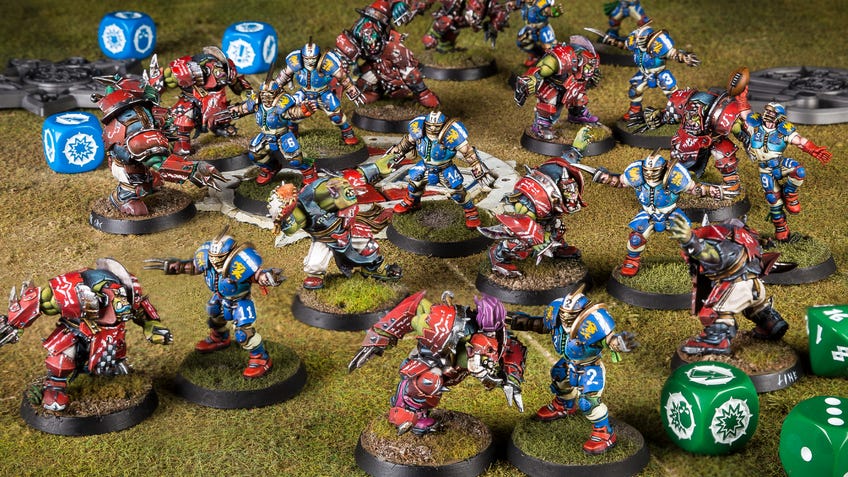Outstanding in their Field: The Blood Bowl custodians who have championed tabletop fantasy football for 30 years
Alive and kicking.
Pounding boots kick up dust from the sun-baked pitch. Reikland Reavers’ star Griff Oberwald darts for the end zone. With victory in his grasp, Griff clutches the ball to his blue-and-white armour and goes for it. But, yards from the line, the Reavers’ captain is knocked down by a hulking troll who proceeds to stomp on his head. “No foul!” cries the referee.
Such are the guts and glory of Blood Bowl, the irreverent miniatures game of fantasy football. Released 33 years ago by Warhammer maker Games Workshop, Blood Bowl has survived the highs and lows of a crowded tabletop division. Today, the game is challenging for titles again after being relegated from its publisher’s line-up in the 2000s.
Blood Bowl has evolved from its 1987 release but the fundamentals of designer Jervis Johnson’s game remain unchanged: you and your opponent take turns marshalling tabletop teams in a mixture of combat and sport. The teams really do make for fantasy football - humans clash with goblins, elves and zombies to name a few.
The first edition drew on Games Workshop’s wargame pedigree but Blood Bowl soon focused on its sporting theme. The biggest change came with 1994’s Third Edition overhaul, introducing a fixed length of 16 turns as well as the ‘block dice’ for which Blood Bowl has become famous.
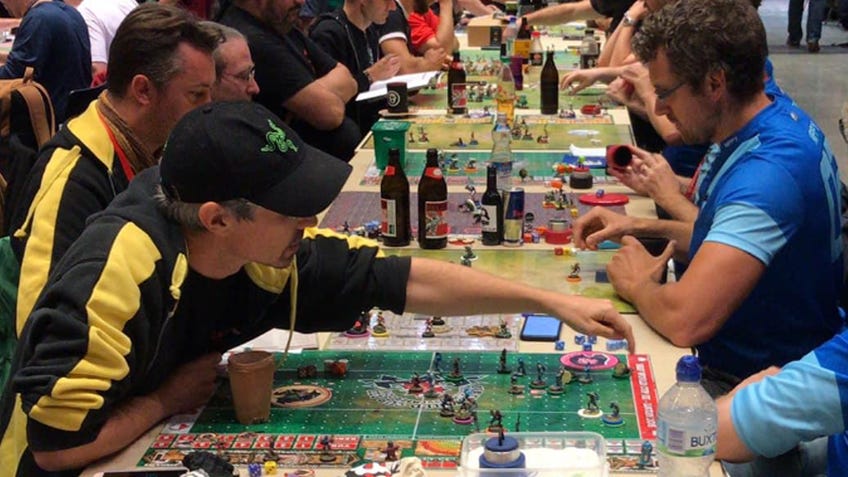
Whatever the edition, coaches pore over the nuance of ‘blitzing’, ‘caging’ and team tactics broadly split between agile, passing rosters such as elves and skaven; those with a strength-based blocking style, including the orcs; and hybrid teams in-between. At the heart of it all is the turnover - the gameplay mechanic that pumps drama into every play. Each model on your team can take an action every turn but should the dice go against you and they cock up by missing a pass or tackle, play immediately switches to your opponent.
The nature of Blood Bowl means it’s really easy to pick up and actually, if you put the time in, you can get to a decent standard quickly.
Blood Bowl doesn’t take itself seriously. Players can get the better of their opponents with less-than-sporting tactics like bribes and secret weapons (the dwarves have access to a murderous steamroller), or even throw their smaller teammates up the pitch. There is a satirical edge, too: the god of Blood Bowl, Nuffle, is a less-than-subtle nod to the NFL and sponsors include Bloodwieser and Orcidas.
The longevity of the game is more than anything thanks to its coaches. Despite support from its designer, Games Workshop’s interest in Blood Bowl waned over the years. The community turned to third-party miniatures and the ball was passed to an independent body, the NAF.
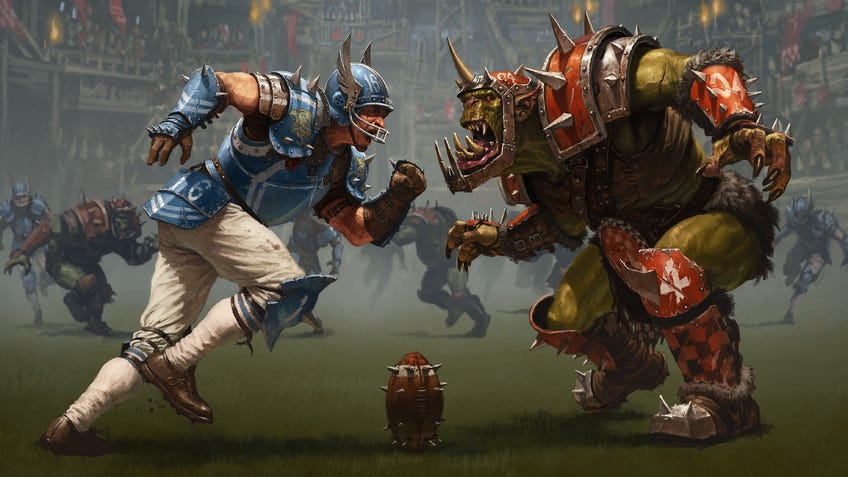
It was Johnson himself who encouraged coaches to establish a Blood Bowl association. The NAF Charter was ratified in 2003 with the goal of becoming a hub for tournament play, rankings, news and conversation for coaches the world over. Like any good constitution, the charter (and its 2004 amendment) codified everything from governance to the election of the great offices of the game: presidency, treasury, webmaster and tournament organisers.
The NAF has had more than 20,000 members during its history, with around 6,000 currently active. Paying members can access digital resources and get their coach name on the rankings register. In the past, NAF members were treated to custom dice which now trade as collectors items online. Trios of the famous ‘Black Block Dice’ have been known to sell for upwards of £70.
The NAF supports tournaments, runs the UK’s NAF Championship (formerly The Blood Bowl) and offers loans to World Cup teams. They review the laws of the game, incorporating new Games Workshop additions, and even run ‘Blocksfam’ - a philanthropic initiative to get spare kit to charity events.
By the time Games Workshop fully withdrew its support in the 2000s, the game had a good player base.
But perhaps the biggest responsibility the NAF has taken on was as custodian of the game itself.
“By the time Games Workshop fully withdrew its support in the 2000s, the game had a good player base and events such as the Eurobowl and the NAF World Cup were well-established,” NAF media officer Alex Wormall says. “Nearly 500 coaches attended the 2011 World Cup in Amsterdam, followed by almost 1,000 in Lucca 2015.”
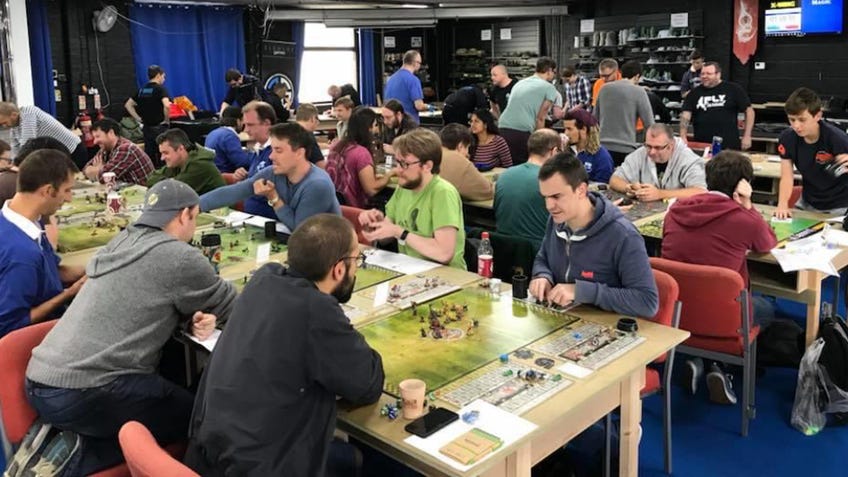
Mike Davies is the former president of the NAF and was the head referee at the colossal 2015 World Cup.
“I think what makes it my game is the simplicity of getting into it,” he says. “I was always pretty rubbish at Warhammer and didn’t seem to be able to get any better with my orc and goblin army.
“The nature of Blood Bowl means it’s really easy to pick up and actually, if you put the time in, you can get to a decent standard quickly, with few barriers to entry.”
Davies has been a stalwart of the tournament scene since 2007 and joined the NAF back in 2013. During his presidency, the NAF established a programme tracking tournament results and developed the ranking system which binds the community together.
“One of my happiest moments in Blood Bowl was during one of the games in Lucca when I was able to just relax for a bit and see that game that I’d invested huge amounts of time and money in being enjoyed by so many people,” he continues.
“It’s become a family affair as both of my boys come to tournaments with me. I’m working on my daughter, though my wife is a lost cause. What I mostly like about the game is facilitating it for others, providing the environment where it can thrive, and helping to build the community.”
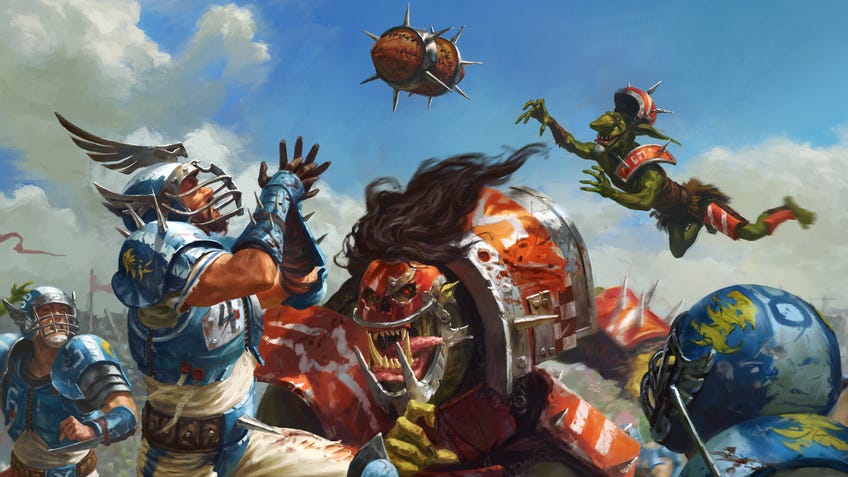
Blood Bowl’s enduring popularity turned heads at Games Workshop again during the boxed game boom of the mid-2010s. Eyeing the passion of coaches - and the success of genre rivals such as Guild Ball and Dreadball that had emerged in the meantime - in 2016 the publisher released a new all-in-one box, known to fans as BB16, which opened the dressing room doors to a fresh intake of players. (Games Workshop declined to offer comment for this article.)
One of my happiest moments was seeing the game I’d invested huge amounts of time and money in being enjoyed by so many people.
With an active community already in place, the starter set was the perfect opportunity to draft in a new generation of rookie coaches. “If you’re a new player that knows no-one, you will feel welcome wherever you turn up,” Wormall says. “If you need a team or dice, someone will lend you some. And if you’re travelling, people will often look to make sure you’ve got a lift - and sometimes a sofa if you’re stuck for accommodation.”
With dice, pitch and ready-to-play coloured teams of humans and orcs, BB16 was both a standalone board game and hobby starter set. Its release came during Davies’ stewardship of the NAF.
“It made for interesting times, and a massive increase to the number of players, games and tournaments,” he recalls. Last year’s World Cup in Dornbirn, Austria, reportedly cost £250,000 to run and saw over 1,400 attendees. “It was a huge relief that the changes to the game were minimal and largely for the better.”
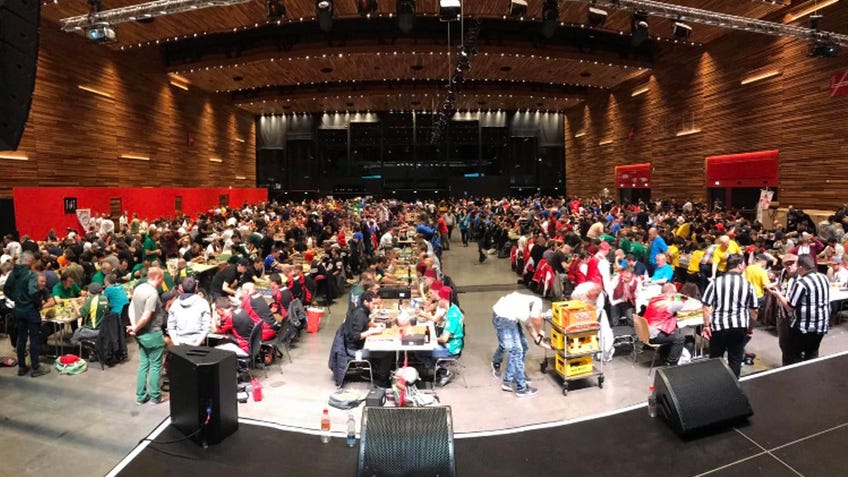
Games Workshop has since released and reissued miniatures for squads old and new. The latest - a quirky snotling team - was announced in April.
Wormall says with Games Workshop’s return, memberships are growing: “A large part of the role of the NAF remains the same even with Games Workshop on the scene: supporting tournaments, encouraging play and pointing people to where they can find local action.
“Now that Games Workshop are releasing new teams and rules there is the job of integrating those into our guidance for tournament sanctioning.
“For the last review that meant, for example, clarifying the ‘disposable’ rule that has been introduced for ogres (the rule allows you to stack your team with ‘free’ grunts to balance out points-heavy ogres) and whether that applies to tournament play.”
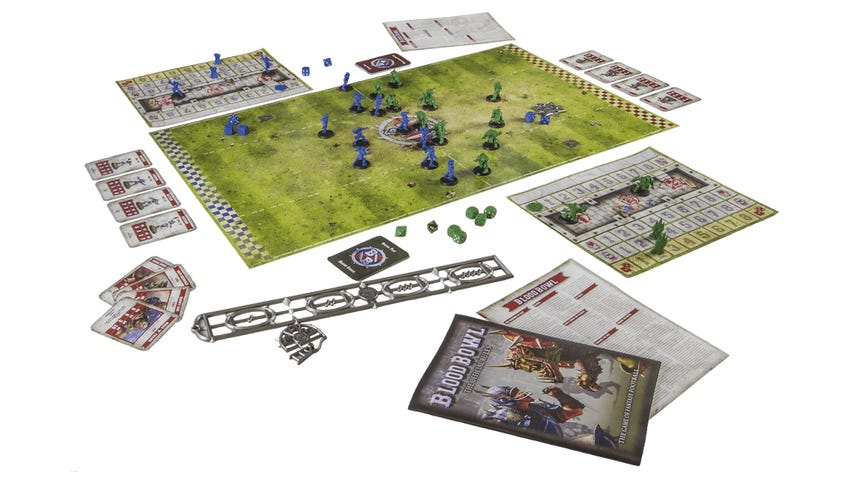
Just like its real-world counterpart, Blood Bowl and the NAF are served by a legion of fans. Lore has sprouted around all 26 teams and a host of blogs, video streams and podcasts feed the community’s hunger for tactics and satire.
There are also not one but two digital versions of the game: the unofficial free-to-play FUMBBL browser game and licensed PC and video game offering Blood Bowl 2.
Drew Buccicone from the Three Die Block fan podcast - named for the toughest tackling manoeuvre in the game - says that, despite its age, Blood Bowl remains “incredibly fresh”.
“It is one of the few board games out there that has a high replay value. Literally every game is different, and that’s based on the teams available, the skills the players have, the dice rolls, and the inducements chosen.”
Buccicone, who has played Blood Bowl for 15 years, adds: “Games Workshop’s return has helped with longevity. We never really get bored talking about our hobby.”
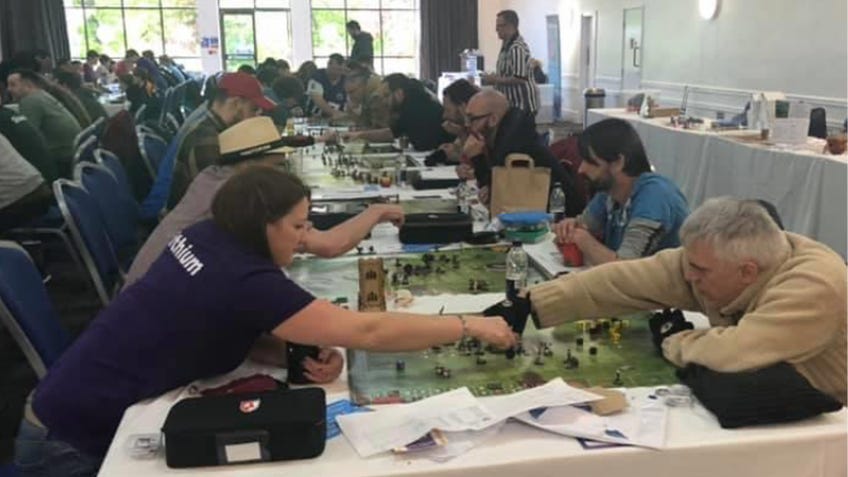
The growing community of coaches is still developing new styles of play. Much like rugby split into Union and League, Blood Bowl has spawned a variety of formats. Fast-paced Sevens - with a smaller pitch and squad sizes - is popular, as is Street Bowl, played on a narrow board with the feel of kick-about football.
Square-jawed star players like Griff Oberwald may claim glory on the pitch, but Blood Bowl owes its success to the loyalty of grassroots coaches. Sporting dynasties rise and fall. The same is true in the tabletop industry. Yet this irreverent game of fantasy football has remained. Perhaps it’s because Blood Bowl does not take itself too seriously. Perhaps because even the most talented blitzer can be stomped by a troll. Or perhaps, as Wormall puts it, because “there is a very low incidence of pillocks in the Blood Bowl community”.
“Blood Bowl has kept me hooked for nearly 20 years and I’ve never wanted a break. I love that it’s so tactical, but that your heart can be broken - or your day made - by some nonsense dice rolls."
